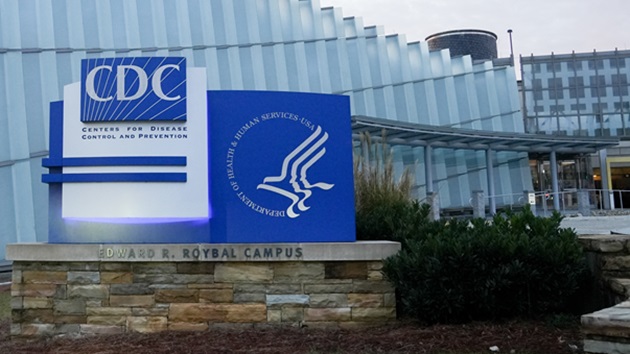Two years after Roe v. Wade, physicians still struggle to provide essential care
Written by ABC Audio ALL RIGHTS RESERVED on June 25, 2024
(NEW YORK) — Facing high fines and potential jail time for providing abortions, Dr. Jennifer Smith, an OB-GYN in Missouri, has had to refer patients out of state.
“I’ve had a patient bleeding through her clothes in the second trimester who had to drive to Illinois for care, because in Missouri, we couldn’t prioritize her life over the life of her fetus,” Smith told reporters during a press conference last week.
The facility where Smith works once brought in patients from across state borders, but now has to do the opposite.
“I had a patient in the second trimester who did have ruptured membranes, but in Missouri, the law does not give us permission to deliver this patient as long as the baby has a heartbeat,” she said.
Another patient seen by a colleague suffered from preeclampsia at 22 weeks and had to “drive hours” to find a hospital that would provide her with care.
“As it relates to pregnancy and abortion care, patients are forced to drive across the border to smaller, less-equipped hospitals just to get the care that they need,” Smith said.
Obstetrics and gynecological care in much of the U.S. has transformed in the two years since Roe v. Wade was overturned, leaving physicians facing tough decisions as they try to provide patients with quality care and struggle to interpret unclear, confusing and strict state abortion laws.
Physicians interviewed by ABC News across several states said they are relying on each other to determine what emergency and lifesaving care they can legally provide patients.
Since the U.S. Supreme Court overturned Roe v. Wade in 2022, ending federal protections for abortion rights, at least 14 states have ceased nearly all abortion services and seven others have restricted care.
Chilling effect
Last year, Indiana was receiving patients from other states until its near-total ban went into effect in August. Since then, physicians have developed workflows to confer over which patients can receive an abortion under exceptions to the ban.
The new workflow is just one way the ban has transformed care in the state. At least six facilities in Indiana have closed their labor and delivery departments, further reducing access to care, according to Dr. Carrie Rouse, a maternal fetal medicine specialist in Indiana.
A public battle between the state attorney general and a complex family planning physician has also created a chilling effect among doctors across the state.
Dr. Caitlin Bernard, one of two complex family planning specialists in the state, came under the national spotlight after it was revealed she provided abortion care to a 10-year-old rape victim from out of state after Roe was overturned.
After she became outspoken about the consequences of abortion bans, the state attorney general tried to strip her of her medical license. Bernard was required to pay after a medical licensing board found that she violated HIPPA — which protects patient health information — “even though the representative from the American Medical Association who came and testified during that medical licensing board hearing said specifically that she did not,” Rouse said.
“The feeling — and I think the reality — is that she was being punished for being an abortion provider, and I think that is very scary for people,” Rouse said.
Rouse added, “Dr. Barnard was essentially punished for providing evidence-based health care and I think the thing that all of us can and should be thinking is: ‘Well, am I going to be next?'”
Care denied
Even in cases that could meet exceptions to bans, Florida hospitals are very hesitant to schedule abortions, according to one physician.
A patient whose fetus had a diagnosis of Trisomy 18, which is described as incompatible with life, and was diagnosed with cervical dilation that was impossible to close, did not qualify for the exception, according to Dr. Cecilia Grande, an OB-GYN in Miami.
The patient’s options were to wait for her water to break or develop a fever — a sign of an infection — otherwise she would have to leave the state to get care, Grande said.
“I know that if a patient has an emergency, they can get to the emergency room right away. But that doesn’t necessarily mean that they can get the care they need,” Grande told reporters at a press conference last week discussing the state of abortion care nationwide. “I want my colleagues in the emergency room to be able to act to help my patients in their moment of need.”
Will it come back to ‘haunt us’?
After the Tennessee trigger ban prohibiting nearly all abortions went into effect in September 2022, physicians struggled to interpret the law and reach a consensus over when they could provide care.
Dr. Sarah Osmundson, a maternal fetal medicine specialist at Vanderbilt University Medical Center, told ABC News that physicians are still struggling to provide care in Tennessee nearly two years after the ban went into effect — with zero guidance on how they should interpret laws and worries about facing prosecution. But some physicians have begun to provide care more liberally.
“Some of us have really taken a stance that if there is a situation that can impact mom’s life — even if it’s not an immediate, life-threatening circumstance — we feel compelled to provide care for those patients,” Osmundson said.
“We have a responsibility as physicians, as clinicians, to take care of patients’ health first,” Osmundson said. “Whether that comes back to haunt us, I don’t know.”
Still, physicians are relying on having input from other doctors before providing abortion care due to state laws.
“We still see patients that come in to us later than was necessary from outside places because they are not getting the care that they should get and that’s largely based on these laws, which make physicians appropriately very scared for own personal safety,” Osmundson said.
Dr. Leilah Spung, a maternal fetal medicine specialist, was the only dilation and evacuation — a second trimester abortion procedure — provider in Chattanooga when Roe was overturned.
“I knew what I needed to do to take care of patients, but I also knew it could send me to jail,” Spung told ABC News. “So that changed my litmus test.”
“At some point, I was going to do something that was going to land me with a felony charge — I was sure of it — because I also wasn’t going to let anyone die,” Spung said.
Months later, Spung would leave the state to practice medicine in Colorado.
“I had a giant target on my back,” Spung said. “Everyone knew exactly what I was doing.”
“I was unwilling to stay and put myself and my family at risk like that. Especially when I was only a year out from 11 years of training,” Spung said.
The threat of prosecution is top of mind for physicians providing care under bans. After a Texas woman asked a state court for an emergency abortion last year and a lower court ruled she could get one, state Attorney General Ken Paxton sent a letter to Houston hospitals threatening liability if they provided the woman, Kate Cox, with an abortion. The Texas Supreme Court later overturned the court ruling and denied Cox an abortion.
By that point, Cox had already decided to leave the state to get an abortion.
Left unsupported
Spung said she felt unsupported by medical facilities in Tennessee when it came to providing lifesaving abortion care.
“I tried really hard with the other abortion care doctors in the state to come up with a unified response to certain emergencies that might come up — the common things like PPROM, significant vaginal bleeding, ectopic pregnancy, cesarean-section scar ectopic pregnancies,” Spung said.
“We worked really hard to get all of the hospitals on board so that everybody was providing the same care … [and] it is seen as the standard of care instead of something outside the bounds of the law,” Spung said. “That just didn’t happen.”
Hospitals were unwilling to have a unified conversation and it was left up to physicians to make the tough decisions, Spung said.
“Anytime there was someone with a complicated pregnancy that may or may not need abortion care, I was the call. I was the person who answered those questions. I was the one who figured out where they could go, who could see them, whether or not they could legally be taken care of in the state or not,” Spung said.
At Vanderbilt, a committee of physicians review patient cases before determining whether they can provide emergency care in line with Tennessee’s abortion ban. But in Chattanooga, it was left up to Spung to make those decisions, she said.
Physicians in Tennessee have also lobbied to add an exception that would permit abortions in cases of fatal fetal anomalies, but lawmakers were not receptive to the push, according to Osmundson. Meanwhile, physicians are regularly seeing patients with fatal fetal anomalies.
“There are huge delays in care for women who are facing these very severe fetal anomalies that are not compatible with life and they are, you know, either forced to continue that pregnancy in the state of Tennessee to watch their child die, or they have to go out of state,” Osmundson said.
In Colorado, Spung’s practice has seen patients from across states with abortion bans, including Texas, Kansas, Nebraska, Wyoming, Idaho, Utah, North Dakota, South Dakota and Oklahoma.
“Our later abortion numbers increased eight times in the year after Dobbs and people are traveling at least 250 miles one way for care,” Spung said.
‘Strength in numbers’
Meanwhile, physicians in North Carolina and Ohio were able to do what Tennessee physicians attempted unsuccessfully.
In Ohio — where an abortion ban has been blocked by a court order — physicians brought together major hospital academic systems and came up with a unified approach to emergency conditions and how they would treat them, according to Spung.
In North Carolina, abortion providers came together and began meeting regularly to confer over care.
“We felt like we had strength in numbers, if we could be pretty unified with how care was being delivered across the state, then there was going to be less discrepancy, less confusion and less likelihood that any of those procedures would be flagged if everybody was doing things kind of the same,” Dr. Clayton Alfonso, an OB-GYN in the state, told ABC News.
“That being said, every institution has their own attorney group and so not everything is perfectly similar,” Alfonso said. “But we try to keep it as close as possible.”
Physicians in the state have resisted requests from legislators to compile a list of conditions that meet exceptions, saying a list could never include all the emergency conditions, diagnoses or complications that arise during pregnancy. But internally, specialists have established a list of conditions they believe meet the exceptions, according to Alfonso, which they are keeping close.
Hospitals and facilities respond to bans
Medical facilities’ responses to bans have varied around the country, in part due to differences between bans.
In North Carolina, Duke University Medical Center’s administration and its OB-GYN chair have been “very supportive” of physicians since the ban went into effect, Alfonso said.
“We were told to care for the patient, and we’ll figure it out on the back end afterwards. [The hospital] said, ‘Trust your medical opinion, your medical judgment — there is no board, there is no conferring,'” Alfonso said.
When it comes to determining what fetal anomalies are “life-limiting” — the term used in the state law — and meet the exception, physicians have relied on high-risk obstetric physicians.
“I believe they have an internal list of things that they’ve written down that they know that they do as ‘life-limiting,’ but that list has not been circulated. It’s been kept pretty close, in trying to make sure that it doesn’t get into the wrong hands of potential future legislation,” Alfonso said.
Compounding the access crisis
The risks and tough decisions physicians are having to make are already driving some away from states with bans, creating what Spung called a “brain drain,” especially of physicians trained to provide complex, lifesaving, medically necessary abortions.
And replacing them will be incredibly difficult.
“There are going to be times where patients come in and are miscarrying and are bleeding to death in front of you, and you don’t have time to give them medication to open their cervix to help them deliver. You need to take them to the operating room and remove the pregnancy and the safest way to do that is either with a dilation and curettage or dilation and evacuation,” Spung said.
An entire generation of OB-GYN providers in states with abortion bans will be unable to get that training.
“It’s going to become an entire vacuum,” Spung said. “Knowing how to safely provide that care can quite honestly save lives.”
Copyright © 2024, ABC Audio. All rights reserved.







